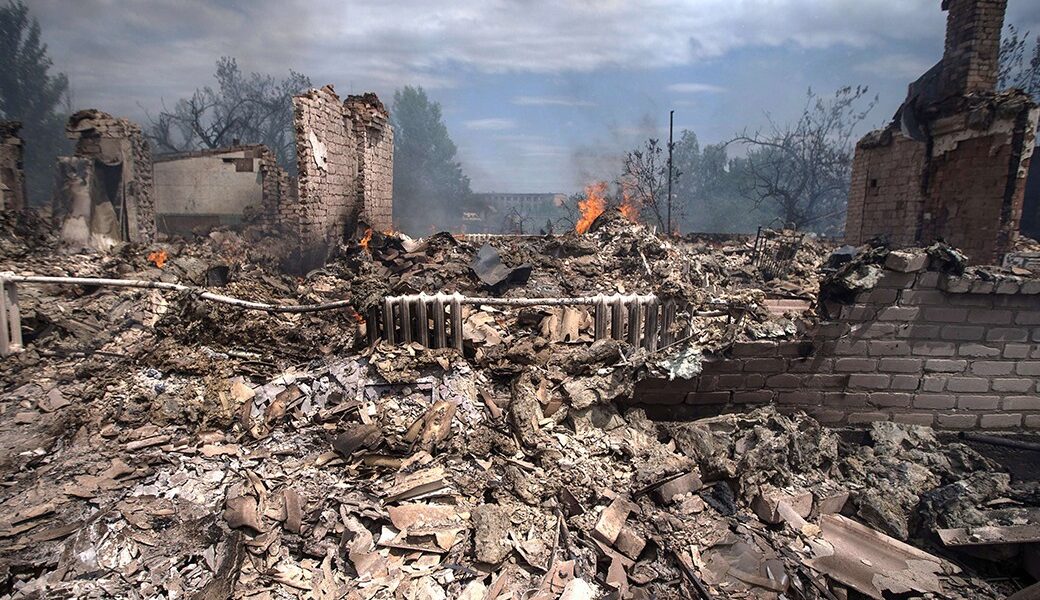The reference of Prime Minister Kyriakos Mitsotakis during his joint press conference with Russian President Vladimir Putin to the Greek expatriates living in Donbass brought to the fore a forgotten part of Hellenism that lives in an area that has been going through difficult years.
"Russia is part of the European security architecture. Therefore a functional relationship ultimately benefits all parties," Mitsotakis said in his joint statements with Putin last week.
"Greece, as a member of the European Union and NATO, is also approaching these relations with great care and that is why I did not hide my concern about the resurgence of tensions in Ukraine.
"I believe that a conflict there will not have a winner, it will only have losers.
"That is why I believe that the Minsk agreements, but also the reactivation of the Normandy scheme, shows us the way.
"Let us not forget that Greece has a special interest in the Donbass region due to the strong presence of Greeks living in the region."
The crescendo of violence in Kiev and the war in Donbas
The violent and bloody incidents that took place in Maidan Square in Kiev in 2014, with the emphasis on Ukraine's connection to the European Union - went down in history as the "Euromaidan movement."
The fall of then-President Viktor Yanukovych, brought a new regime to Kiev which tried to ban the Russian language as a second local language.
After the failed attempt to ban the Russian language came the episodes in Odessa.
On May 2, 2014, civilians protesting peacefully were attacked by members of neo-Nazi organisations, which the new Kiev regime took to the city with orders to attack those gathered.
Kiev then banned the parades on May 9 to commemorate "Victory Day" against Nazi Germany. In Mariupol, police were ordered not to allow anyone to celebrate, however, police refused to use violence against any citizen who wanted to parade.
Now the two big cities, Donetsk and Luhansk, have declared themselves as "People's Republic's."
45-year-old Ludmila Kontopoulou-Sliachta, born in Luhansk, has Russian parents but 27 years earlier she came to Greece and married a Greek, starting her own family.
But she always visited Luhansk, which she said was once a "rich city" of about 500,000 inhabitants and several Greeks.
She explained that in neighbouring Donetsk, there about 1,000,000 inhabitants, with many of them Greeks.
The last time Kontopoulou-Sliachta visited Luhansk was in April and she stayed until the end of June for a family affair.
The city bears no resemblance to the old image, especially with the pandemic in full swing, she explained. The restrictions on movement at night makes it almost a dead city.
At the end of 1922, Ukraine became one of the founding republics of the Soviet Union and became independent after the fall of the Soviet Union in 1991.
After the war in the two People's Republics of Luhansk and Donetsk, their currency is the Russian ruble, their laws are based on the legislation of the Russian Federation, and their books are based on Russian education.
"Even the vaccine that the people are getting is the Russian Sputnik," she said, adding that now Ukraine's attitude towards them is negative as they feel Russian and not Ukrainian.
Due to the financial strength that existed in the area, there is now a decline.
"There were too many factories then. Now some are closed and others are under-functioning," she said, adding that there are many power supply problems of various kinds "because of the embargo the city has on Ukraine and vice versa."
Residents of the two cities have the so-called "internal passport", ie the two republic's can get a Russian passport with some additional papers.
"But in the Russian passport, because the address of residence is not indicated, we cannot go with it to all countries except Russia, Ossetia and Belarus. Those who also have a Ukrainian passport can travel everywhere," she explained.
She also pointed out that she has a Russian and a Greek passport.
"In Luhansk we are closer to the Russian border and we feel more protected, while Donetsk borders Ukraine, with the result that the Ukrainian army is closer and now the situation has erupted again.
"They hear a lot of stray bullets and shells fired by the Ukrainians.
"A few days ago I spoke to a friend of mine who keeps in touch with Donetsk, she has several friends there and they told her that 'we sit at home and listen to the shells again.'
"And now imagine that all the inhabitants of both areas, from the sound understand what shell is falling.
"Unfortunately, man is accustomed to living in any condition."
Residents of the area live in insecurity about their present and future, said Kontopoulou-Sliachta.
"They have no stability, this situation is not going anywhere. They feel like citizens without a future.
"Every day they expect that 'the Ukrainian army will now attack us.'
"I experienced this during the Easter I was there. But everyone was saying 'we do not care anymore, we are not afraid.'
"This is the view of the people and they want to reunite with Russia or at least become independent countries. It is a rich area even though the Ukrainians have robbed us," she concluded.
READ MORE: Ukraine does not consider Greeks in Donbass or Crimea to be indigenous to the country.


